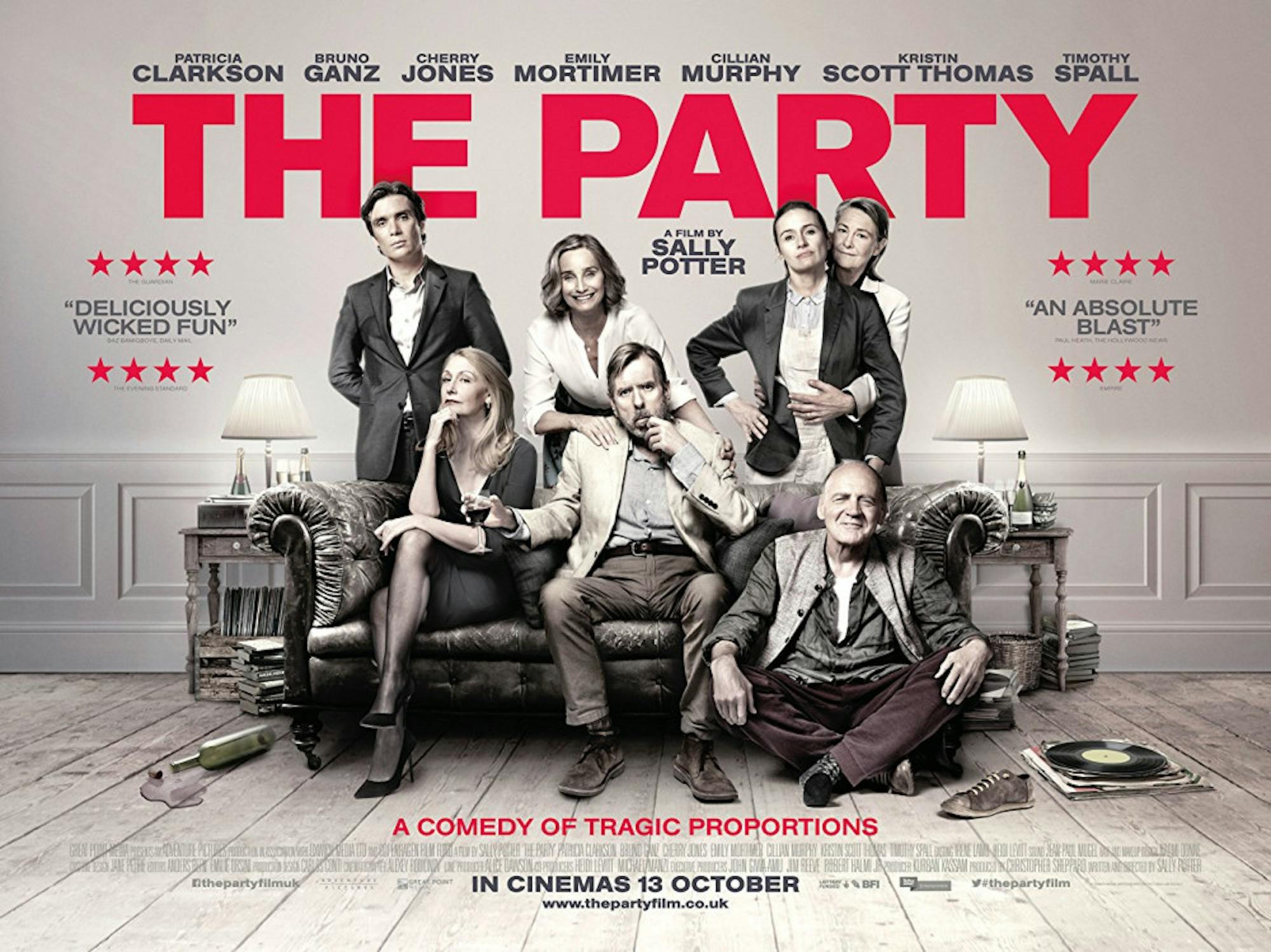"The Party" (2017),released in the United States on Feb. 16, had potential. Affairs, death, politics, cocaine and the ultimate Chekhov's gun — the makings of an epic political comedy in a one-act dinner party setting — are all there. Unfortunately, the politics and humor fall flat.
Directed by Sally Potter, "The Party" centers on Janet (Kristin Scott Thomas), and the dinner party she's hosting is in celebration of her recent appointment as the British Shadow Minister of Health. Her guests are a series of oddball couples. There's her best friend, the sardonic and cynical April (Patricia Clarkson) with her newly ex-boyfriend Gottfried (Bruno Ganz), a spiritual healer and motivational speaker. There's Martha and Jinny (Cherry Jones and Emily Mortimer, respectively), the women's studies professor and her young wife, who is pregnant with triplets. And there's Tom (Cillian Murphy), one half of a rich, young power couple who keeps snorting coke in the bathroom and is armed with a gun he's unsure of what to do with. Finally, there is Janet's husband, Bill (Timothy Spall), who at the start of the film is already three sheets to the wind on red wine and intent on speaking his mind by the end of the night. None of the couples are happy and most, as it turns out, are cheating. We expect raucousness as the movie progresses, and we get it.
For what it's worth, the cinematography is better than it had to be; shot in sumptuous black and white, "The Party" incorporates unconventional angles and artful close-ups to keep the audience engaged. The big problem with "The Party" is that it just could have been funnier. It has its funny moments; Spall gives the performance of the night as a drunk intellectual who gave up a teaching position at Yale (or was it Harvard?) and now uses his brainpower to quote Catullus and Virgil to women decades younger than him. He bonds hilariously with Gottfried, and the scenes with only Bill, Gottfried and Tom in the same room are the funniest of the movie. They also provide Bill's funniest moments — even when he's unconscious. Clarkson, as usual, delivers some welcome, biting one-liners. As Martha and Jinny publicly fight over Martha having once slept with a man, Jinny cannot contain her disgust. She dramatically cries out, "You HAVE had a man inside you!" to which April quips, "You might have three little men inside YOU."
The characters are all familiar archetypes: The quack motivational speaker/healer who scoffs at Western medicine, the cold women's studies professor, the pregnant woman who only cares about her pregnancy and the young, attractive, drug-addled businessman. If nothing else, putting them all together in one setting for a whole movie would have been a great opportunity for new, funny interactions between old stereotypes. Unfortunately, many of these opportunities are squandered. Where is Martha's outrage over Gottfried's attempts to remove Bill from the "negative female energy" in the room? April and Tom are the two most dynamic characters in the movie, but there are no scenes of them either flirting or sparring. Jinny and Tom interact alone in several scenes, but the Divine Life-Giving Woman has, inexplicably, nothing funny to say to that guy in your economics class who's getting his MBA after graduation and loves Machiavelli. Janet, the main character, offers few funny moments herself, possibly because her character is so hard to pin down. She has some quite hypocritical anger toward her husband's infidelity, which isn't really confronted. Her political loyalties are questionable: She's quick to give up her new position in Parliament out of devotion to her husband but pauses when her husband admits that he's sought a private health care provider after deeming their NHS benefits insufficient. That amusing detail isn't even developed into a full joke.
Speaking of healthcare and politics, "The Party" seems intent on inserting political references into the movie. Yet it fails to develop them in any way. April mentions multiple times that she's a cynic who's lost faith in Parliamentary procedure, even though she supports Janet. Is Parliamentary procedure a metaphor here for rich people's baseless need to have dinner parties with their incompatible friends? Is Parliamentary procedure failed marriages and overlooked affairs — and if so, is significant political action represented by Chekhov's gun? Was the fact that the manipulative middle-aged cheater shared the first name of legendary cheater Bill Clinton a coincidence? No political parallels, let alone commentaries, are explored for such an oddly political script. Like a mediocre, stuffy dinner party, "The Party" is only barely worth its sweet conclusion.
'The Party' is not lit

A promotional poster for 'The Party' (2017) is pictured.
Summary
Despite artful cinematography and a funny premise, "The Party" remains unsatisfying.
2.5 Stars





